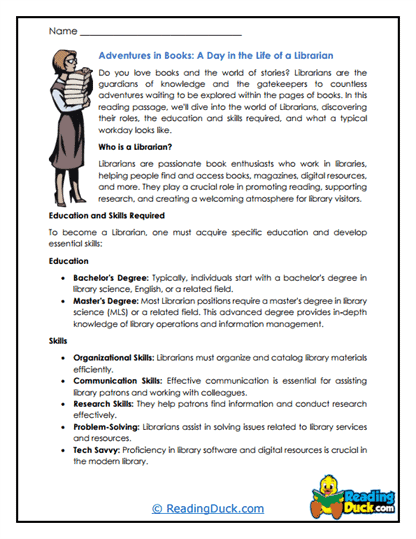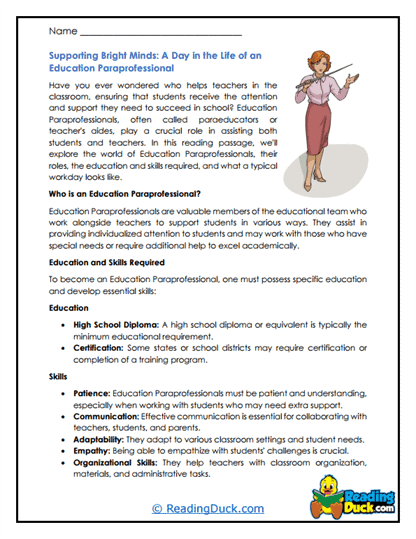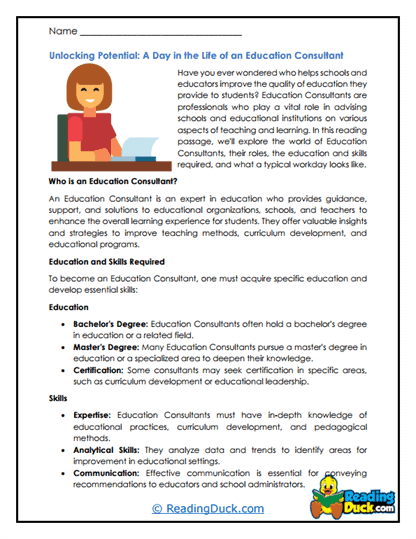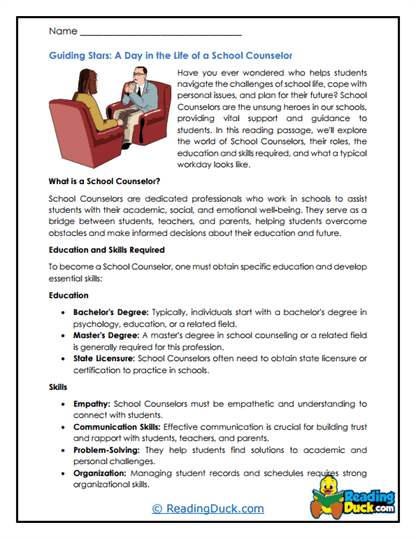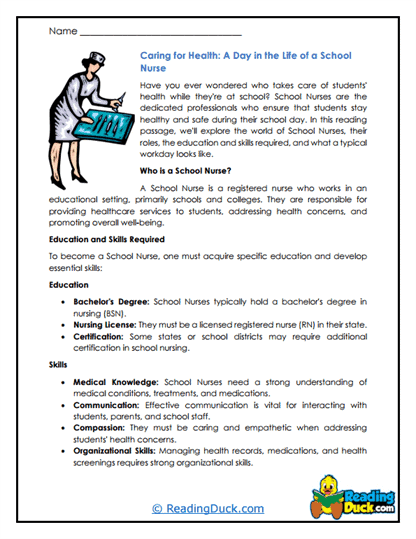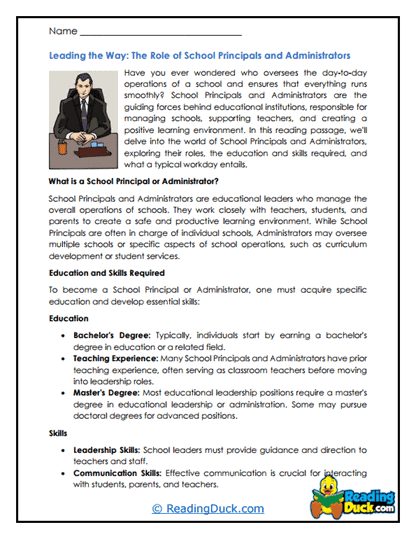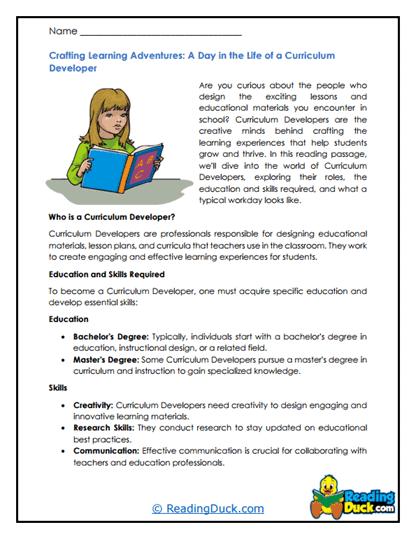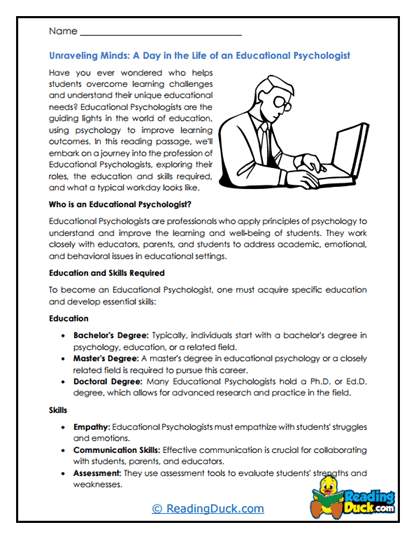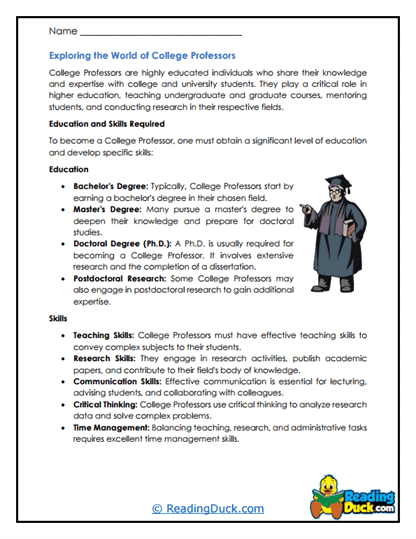Careers in Education Worksheets
About Our Careers in Education Worksheets
Our Careers in Education Worksheets offer an engaging and comprehensive exploration of the diverse and rewarding field of education. These worksheets are designed to introduce students to various careers within the education sector, from classroom teaching to educational administration, counseling, and beyond, helping them understand the roles, responsibilities, and paths to success in these impactful careers.
This topic contains several worksheet sets, each focusing on a specific aspect of education careers. Each worksheet set includes:
- Multiple Choice Questions: These questions assess students' comprehension of the reading passages, focusing on key details about different education careers, the required skills, and the educational paths needed for success.
- Short Answer Questions: Students are prompted to provide concise responses, summarizing important information, analyzing the roles and responsibilities of various education careers, and reflecting on how these roles contribute to the broader educational system.
- Open-Ended Questions: These questions encourage students to think critically and express their personal interpretations, opinions, and preferences related to the education topics they have read about, fostering a deeper connection to the subject matter.
These worksheets are designed to help students demonstrate their understanding of education careers while fostering meaningful engagement with the opportunities available in this field. An answer key is provided for each question sheet, making it easy for teachers and parents to evaluate student progress. The worksheets are available in PDF format, ensuring they can be easily viewed electronically, downloaded, and printed.
Exploring Careers in Education: Shaping the Future Through Learning
Education is a field that offers a wide range of career opportunities, all focused on the common goal of fostering learning and growth. From guiding young minds in the classroom to developing educational policies, the careers within this sector are as diverse as they are essential. Whether you're interested in becoming a teacher, counselor, administrator, or educational consultant, the field of education provides opportunities to make a lasting impact on individuals and communities. Understanding the various careers in education helps students see how they can contribute to shaping the future through teaching, leadership, and innovation.
Students exploring careers in education will delve into several key aspects:
- Diverse Career Opportunities: The education sector offers a broad spectrum of careers, each with its own unique focus and skill set. Students will explore roles such as elementary and secondary school teachers, who are directly involved in shaping the academic and social development of students; educational administrators, who oversee school operations and implement policies; and school counselors, who support students' academic and emotional well-being. They will also learn about emerging careers in educational technology, special education, and curriculum design, where new approaches to teaching and learning are being developed. Understanding the variety of careers in education helps students see the broad spectrum of possibilities within this field, from direct interaction with students to behind-the-scenes roles that support the educational system.
- Educational Pathways and Skill Development: A successful career in education often requires specialized education, training, and ongoing professional development. Students will explore the different educational pathways available, such as degrees in education, psychology, or educational leadership, as well as certification programs that qualify individuals to teach specific subjects or work in specialized roles. They will also learn about the essential skills needed in education, such as communication, patience, empathy, and the ability to adapt to different learning styles. By understanding these pathways and skills, students can better plan their educational journeys and career goals within the education sector.
- Impact and Influence in Education: One of the most rewarding aspects of a career in education is the ability to make a meaningful impact on the lives of others. Students will explore how educators influence not only the academic success of their students but also their personal growth and development. They will learn about the role of teachers in fostering critical thinking, creativity, and lifelong learning, as well as the importance of providing a supportive and inclusive learning environment. This exploration highlights the profound effect that educators have on their students and the broader community.
- Challenges and Rewards of Teaching: While a career in education can be incredibly fulfilling, it also comes with its own set of challenges. Students will examine some of the common challenges educators face, such as managing diverse classrooms, addressing learning differences, and adapting to changes in educational standards and technology. They will also explore the rewards of teaching, including the satisfaction of helping students achieve their goals, the opportunity to inspire a love of learning, and the potential for personal and professional growth. Understanding these challenges and rewards helps students gain a realistic perspective on what it means to work in education.
- Global and Local Perspectives on Education: Education is a field that operates on both a global and local scale, impacting communities around the world. Students will explore how educational careers affect local communities, such as through public school systems, community colleges, and adult education programs. They will also consider the global dimensions of education, including international teaching opportunities, educational policy development, and the role of education in promoting global citizenship and addressing social issues. By understanding these perspectives, students can appreciate the interconnectedness of education with global and local communities.
- Innovation and Technology in Education: The field of education is continually evolving, with new technologies and approaches transforming the way we teach and learn. Students will explore how educational technology, such as online learning platforms, digital classrooms, and interactive educational tools, is changing the landscape of education. They will also learn about careers in educational technology, where professionals develop and implement these tools to enhance learning experiences. This exploration encourages students to think about how they might contribute to the future of education through innovative thinking and the integration of technology.
Through the study of careers in education, students will gain a comprehensive understanding of the opportunities available in this field, the importance of education in society, and the skills and knowledge required to succeed in an educational career.
Integration of These Worksheets In A Learning Curriculum
Integrating the study of careers in education into a learning curriculum can provide students with valuable insights and practical knowledge that extend beyond the classroom. Here are some practical ideas for using these worksheets in various subjects:
- Career and Technical Education (CTE): Use the worksheets in CTE courses focused on education and human services to help students explore specific career paths within the education sector. These worksheets can serve as the foundation for discussions, case studies, and projects that allow students to apply what they have learned to real-world scenarios.
- Social Studies and History Classes: Incorporate the worksheets into social studies or history classes to explore the role of education in shaping society. Students can analyze the history of education, the impact of educational policies, and the role of educators in promoting social change and equity.
- English and Communication Classes: Use the worksheets to help students develop essential communication skills needed in education, such as writing lesson plans, creating educational materials, or delivering presentations. Students can also analyze case studies of effective communication in educational settings.
- Interdisciplinary Projects: Encourage students to participate in interdisciplinary projects that combine education studies with other subjects, such as psychology, sociology, or technology. For example, students could work on a project to design a curriculum for a specific subject, develop a technology-driven lesson plan, or research the impact of educational interventions on student outcomes.
- Teaching Assistant Opportunities: Provide students with the opportunity to gain hands-on experience in education by serving as teaching assistants or peer tutors. These roles allow students to apply the concepts they have learned in the worksheets and gain practical experience in classroom management, lesson planning, and student engagement.
- Field Trips and Guest Speakers: Enhance the learning experience by organizing field trips to local schools, educational institutions, or teacher training centers. Additionally, invite guest speakers from various educational careers to share their experiences and insights with students, providing them with a real-world perspective on the opportunities available in education.
- Service Learning Projects: Encourage students to engage in service learning projects related to education, such as volunteering in after-school programs, mentoring younger students, or developing educational resources for the community. These activities allow students to apply their learning in practical ways and contribute to their communities.
Studying careers in education through these worksheets can significantly enhance students' communication, leadership, and critical thinking skills. By exploring the diverse opportunities within education, students develop a greater appreciation for the vital role this field plays in shaping the future. These skills not only contribute to academic success but also prepare students for informed decision-making and potential future careers in this essential field. Encouraging curiosity and interest in education can lead to a lifelong appreciation for the impact that educators have on individuals and society as a whole.
